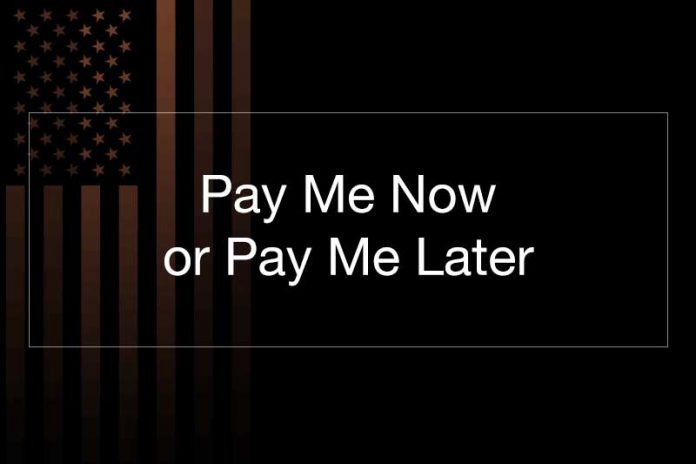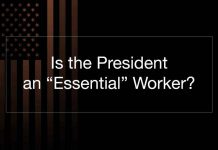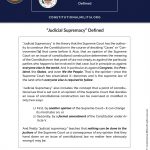Last Updated on October 4, 2021 by Constitutional Militia
As most patriotic activists will attest, trying to save one’s country from sinking under the dead weight of its own increasingly hapless citizenry is a task daunting and thankless enough without the distraction of having to respond to an endless stream of captious criticisms. Most of these come from people who seem not to understand that, because printing has been invented, they can find the answers to their concerns easily enough through their own efforts—and that, in the long run, this is the best practice for anyone who actually wants to be a self-governing citizen of a free country. Yet some questions arise so frequently—and from so many individuals who ought to know better—that they should be put to rest once and for all, so that attention can be directed to more important matters.
The two most frequent criticisms expressed to me against revitalization of “the Militia of the several States” focus on the alleged “impracticability” and “inadvisability” of the project.
[1] The basic argument from “impracticability” is that revitalization of the Militia will simply never get off the ground. Enough average Americans, so the nay-sayers contend, will never participate, because the task is too time-consuming, too difficult, and too costly. To be sure, I know that a kernel of truth lurks in this complaint—because, perhaps more than anyone else, I personally have discovered just how extensive, exhausting, expensive, and even exasperating this task really is. But precisely my own experience leads me to conclude that, in most cases, the argument from “impracticability” is really nothing more nor less than the particular complainant’s rhetorically camouflaged way of saying that he does not want to contribute any of his time, money, or effort to revitalizing the Militia. He attributes to the safely indefinite “they”—those nameless, faceless, conscienceless Americans among the “sheeple”—what in fact is his own reluctance to separate himself from the flock. Perhaps such people are just lazy. Perhaps they are afraid of being associated with the “M” word that the big media and various crackpot special-interest groups, particularly among “gun controllers” and certain self-styled “civil-rights” organizations, work so assiduously to demonize today. For whatever reason, in contrast to Thomas Paine’s “summer soldiers” and “sunshine patriots”, these nay-sayers scurry to evade participation and withhold support even in the sunshine of summer, not realizing (or perhaps not even caring) that, unless the Militia are revitalized soon, America will enter a prolonged period of frigid darkness that will affect them as much as anyone else. Thus, the short answer to such a complaint is: “Speak for yourself, fellow! Do not impute to other Americans your own shortcomings, as an excuse for your own insouciance and inaction.”
A variant on the argument from “impracticability” is that, even were the Militia revitalized, they would fail to perform their functions properly, because average Americans are simply not capable of the self-sacrificing commitments to their communities that characterized their forebears in Colonial days. Thus, revitalization of the Militia would actually waste the resources devoted to it, and might even prove counterproductive. The sharpest retort to this complaint is that, even if revitalization of the Militia might fall short of expectations, the Constitution requires it. And the Constitution is “the supreme Law of the Land”.
No one could seriously contend that America should or could dispense with all constitutional government, simply because some of the voters, or the politicians who stand for election, or those individuals elected or appointed to public office might possibly, or even would be likely to, neglect, fail to carry out, or refuse outright to perform their civic duties. Of course various Members of Congress, Presidents, Justices of the Supreme Court, Governors and Legislators in the States, and other officials might “go bad”. To one degree or another, some—even many—of them have “gone bad” ever since the Constitution was ratified! And some—even many—of them will continue to do so. As consequences of Original Sin, such failings are inevitable and unavoidable. But, confronted by this human frailty, is the proper response simply to give up, or stoically to try even harder?
Moreover, why should patriots assume that revitalization of the Militia will not work? The Second Amendment declares that— in contrast to voters, Members of Congress, Presidents, Justices of the Supreme Court, Governors and Legislators in the States, and other assorted officials, good or bad—“[a] well regulated Militia” is “necessary to the security of a free State”. “A well regulated Militia”—and nothing else. Thus, America has the Founders’ own assurance—as well as the assurances of political philosophy and history—that properly organized, armed, disciplined, and trained Militia can and will work, if common Americans do their part. But that common Americans will do their part is part and parcel of the very concept of “Militia”. “A well regulated Militia” consists of the people themselves, actually performing the tasks required of them.
Admittedly, Americans cannot rely on incompetent, fallible, duplicitous, and even treasonous “representatives” who say one thing when they stand for election, then do precisely the opposite when safely in office. But can Americans—or at least patriotic Americans—no longer rely on themselves? Should Americans assume, before they even try, that they are unequal to the task their own “supreme Law” instructs them to perform, and upon the fulfillment of which their freedoms depend? That, in decisive numbers, they will turn out to be defeatists and turn tail as deserters? To listen to the nay-sayers, Americans are no better than that. But, once again, the short answer must be: “Speak for yourself, fellow!”
[2] The argument from “inadvisability” goes beyond the argument from “impracticability”. It contends that, once revitalized and subject to orders from the Governors of the several States, and ultimately from the President of the United States as “Commander in Chief”, the Militia will become the pliant and efficacious tools of usurpers and tyrants who will somehow inveigle themselves into those offices—so that revitalization of the Militia will merely supply a large and potent force with which these miscreants can oppress the people.
This dark prophecy assumes that Americans in overwhelming numbers—in the style of the zombified followers of the Reverend Jim Jones—will brutalize and even kill one another in collective suicide if ordered to do so by some charismatic “leader”. The Constitution, however, denies this possibility, when it declares that “[a] well regulated Militia” is “necessary to the security of a free State”. Unless “the supreme Law of the Land” is self-contradictory and absurd, and the Founders were utter fools, the Militia cannot be “necessary” to that purpose and at the very same time useful for the overthrow of such a State. “A well regulated Militia” is immune from all tendencies to political suicide.
Moreover, the argument from “inadvisability” runs counter to the whole theory of representative self-government upon which America rests—that We the People, if given the opportunity under the proper circumstances, will tend to choose representatives who will conscientiously advance the People’s true interests.
In operation, of course, representative government suffers (as does every other human endeavor) from various frictions arising out of Original Sin. In contemporary America, the political process has been hijacked and nearly derailed by various anti-social and anti-constitutional “factions”— professional politicians, bureaucratic political parties, mendacious big media, utterly corrupt intelligentsiia, and other malign special interests. But these essentially criminal enterprises will be unable to control the Militia. For the Militia will be too thoroughly organized throughout their communities. Yet they will also be so decentralized that the Forces of Darkness could never enlist agents of influence sufficient to infiltrate anything approaching even a sizable minority of the Militia companies in any jurisdiction.
Moreover, the Militia will operate throughout the critical periods between elections, constantly and incisively evaluating what public officials are doing (or not doing), how their behavior conduces to (or endangers) “homeland security”, and what the Militia themselves need to do to correct the situation. As people’s political observations, discussions, astuteness, and vigilance increase through their participation in the Militia, the likelihood will approach zero that individuals known, or even suspected, to be actual or potential usurpers and tyrants will be elected Governor, President, or for that matter animal-control officer. And if, perchance, the Militia are deceived, and an aspiring usurper or tyrant does, through stealth, temporarily ensconce himself in a Governorship or the Presidency, the Militia will simply disobey his illegal orders—will see to his impeachment, conviction, and removal from office—and, at the very least, at the next election will replace him with an honest American. Which possibilities will act as the strongest possible deterrents to any attempts by rogue public officials to misuse the Militia as mindless myrmidons of usurpation and tyranny.
Along this line, one of my correspondents expressed his anxiety that “the present government * * * could/would federalize the[ revitalized Militia] into active duty, send them off to obscurity, or replace their patriotic officers with their lackeys”. But the General Government in the Disgrace of Columbia could not “replace the[ Militia’s] patriotic officers with their lackeys”— because the States, not the General Government, appoint all of the officers in their Militia (except for the President). Article I, § 8, cl. 16 and Article II, § 2, cl. 1. In addition, Congress and the President could “federalize the[ Militia] into active duty” only for one of three constitutional purposes: “to execute the Laws of the Union, suppress Insurrections and repel Invasions”. Article I, § 8, cl. 15. And none of these purposes would allow for the Militia to be sent off “to obscurity” (by which I assume my correspondent meant some foreign land). Furthermore, the President functions as the “Commander in Chief * * * of the Militia of the several States” only when they are in “the actual Service of the United States”. Article II, § 2, cl. 1. Which, as I have explained in a previous commentary, provides explicit constitutional authority for the Militia themselves to challenge the President’s orders on the grounds of his perceived usurpation or tyranny. Think about it: Would constitutional Militia, expressly required and empowered by the Constitution “to execute the Laws of the Union”, obey some unconstitutional command aimed at destroying their own effectiveness or even existence, and thereby “the security of a free State” for which the Militia are “necessary”? Keep in mind as well that, when the Militia do not exist, disobedience by the people to the dictates of rogue public officials amounts (according to those officials) to a violation of “law”; whereas, when the Militia do exist, their disobedience of an unlawful order has the force of law then and there, in and of itself.
[3] But even if the arguments from “impracticability” and “inadvisability” carried some weight in fact and logic, how could We the People accept them as the basis for sound policy? After all, one should always follow the wise admonition to “weigh a risk against a certainty”. Without revitalization of the Militia, America is on the fast track to a para-militarized police state as surely as you are reading this very sentence. With the Militia revitalized, usurpers and tyrants might, in the most unlikely of circumstances, finagle some minor part of the Militia into the service of oppression. More likely, though, revitalized Militia would be able to deter the establishment of a police state, or to repel the impositions of a police state if it were established, or to carry on underground resistance against such a police state until through attrition it were worn down and then overthrown.
So, as the saying goes, “you can pay me now or pay me later”. One can cast about for insubstantial arguments as an excuse for denying how far the subversion of this country has proceeded and for evading one’s duty to stand up against the subversives. Or one can “bite the bullet”, as it were, and prepare, individually and collectively, to restore America’s constitutional foundations—now, before it is too late. Either course of action will be costly. But anyone with an IQ greater in magnitude than his age knows which alternative will be more so, even unto America’s ruination. Et non datur tertius.
©2009 Edwin Vieira, Jr. – All Rights Reserved.




































